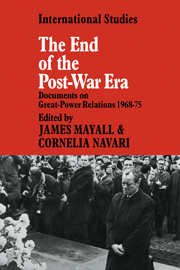Book contents
- Frontmatter
- Contents
- Preface
- Source Abbreviations
- Note on the texts of the documents
- Introduction
- I THE END OF THE COLD WAR
- II THE DIPLOMACY OF DETENTE
- III CHANGES IN THE WESTERN ALLIANCE
- IV THE WARSAW TREATY ORGANISATION
- V THE GREAT POWERS AND THE MIDDLE EAST WAR OF OCTOBER 1973
- VI THE CRISIS OF THE INTERNATIONAL ECONOMIC ORDER
- A The International Monetary System
- B The Framework of International Trade
C - The Question of Energy and Raw Materials
Published online by Cambridge University Press: 07 October 2011
- Frontmatter
- Contents
- Preface
- Source Abbreviations
- Note on the texts of the documents
- Introduction
- I THE END OF THE COLD WAR
- II THE DIPLOMACY OF DETENTE
- III CHANGES IN THE WESTERN ALLIANCE
- IV THE WARSAW TREATY ORGANISATION
- V THE GREAT POWERS AND THE MIDDLE EAST WAR OF OCTOBER 1973
- VI THE CRISIS OF THE INTERNATIONAL ECONOMIC ORDER
- A The International Monetary System
- B The Framework of International Trade
Summary
Communiqué issued following the meeting of the Organisation of Arab Petroleum Exporting Countries (OAPEC), Kuwait, 17 October 1973
Arab countries with their oil exports participate in world prosperity and economic development and in spite of the fact that the production has passed the limit which is required by the local economic situation and the prospective needs, these countries carried on increasing their production, sacrificing their local interest for the sake of world cooperation and of the consumers' interests.
It is a well-known fact that vast areas in the Arab countries were occupied by Israel by the force of arms in June, 1967. Israel carried on with its occupation, ignoring United Nations resolutions, defying all calls for peace whether from Arab countries or from other peace-loving countries.
In spite of another fact that the world community has commitments to implement the United Nations resolutions and not to allow the aggressor to get the fruit of his aggression or to occupy other countries by force, most big industrialised countries which consume mainly Arab oil did not adopt any procedure which demonstrated their awareness of their commitment.
On the contrary, some of these countries have backed the occupation and the US in particular, has been very active before and during the present war in supporting Israel with all available resources, a situation which increased the Israeli arrogance and enabled it to go on defying the legal rights and the basic rules of international law.
- Type
- Chapter
- Information
- The End of the Post-War EraDocuments on Great-Power Relations 1968-1975, pp. 603 - 642Publisher: Cambridge University PressPrint publication year: 1980



